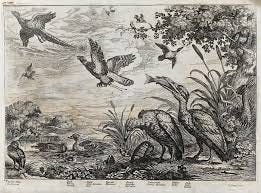An entangled bank
To celebrate Earth Day tomorrow, here is the last paragraph of Charles Darwin's On the Origin of Species--a scientist who wrote like a novelist
It is interesting to contemplate an entangled bank, clothed with many plants of many kinds, with birds singing on the bushes, with various insects flitting about, and with worms crawling through the damp earth, and to reflect that these elaborately constructed forms, so different from each other, and dependent on each other in so complex a manner, have all been produced by laws acting around us. These laws, taken in the largest sense, being Growth with Reproduction; Inheritance which is almost implied by reproduction; Variability from the indirect and direct action of the external conditions of life, and from use and disuse; a Ratio of Increase so high as to lead to a Struggle for Life, and as a consequence to Natural Selection, entailing Divergence of Character and the Extinction of less-improved forms. Thus, from the war of nature, from famine and death, the most exalted object which we are capable of conceiving, namely, the production of the higher animals, directly follows. There is grandeur in this view of life, with its several powers, having been originally breathed into a few forms or into one; and that, whilst this planet has gone cycling on according to the fixed law of gravity, from so simple a beginning endless forms most beautiful and most wonderful have been, and are being, evolved.
What we love about this passage…
We love the way in which Darwin moves from the microscopic to the cosmic in the space of a few sentences. He starts with a close-up of an ‘entangled bank’, asking us to picture the many life forms that inhabit this little patch of ‘damp earth,’ and winds up envisioning the planet and earth’s ‘endless forms’ spinning on into the universe and throughout time. He gives us both meanings of ‘earth’ at the same time: the earth beneath our feet (or in a river bank), and the Earth that is our planet, our home.
Most of all, it’s his narrative voice that stands out—it’s as if we’re being taught science by George Eliot (who was, along with Thomas Hardy, one of the writers most deeply influenced by Darwin). We love the tone of wonder, something Darwin never loses no matter how technical and detailed he gets; there is always the sense of awe and enchantment at the workings of nature.
This was the final paragraph as it appeared in the very first edition of the book, and it caused a furore because Darwin made no mention of how the various beings got created, simply saying that life was ‘breathed into’ a few forms. Such was the outrage over his omission of any kind of divine hand that Darwin reluctantly agreed to add the word ‘Creator’ to subsequent editions, so that it read ‘breathed by their Creator.’
About the Author
Charles Darwin (1809-82) was an English naturalist and co-developer (with Alfred Russel Wallace, working in parallel and coming to the same conclusions) of the theory of evolution by Natural Selection. They jointly made their findings public in 1858 and Darwin published On the Origin of Species the following year. He also wrote many other books including The Expression of the Emotions in Man and Animals and The Descent of Man, in the 1870s. He died on 19 April 1882 and was buried in Westminster Abbey.
To read alongside…
Other great reads for Earth Day include the poems of Thomas Hardy, in particular the late poem ‘Afterwards’ (1917) which movingly ponders the significance of observing nature in all its forms, whether a hawk in flight or a hedgehog that ‘travels furtively over the lawn’. Hardy wonders if he is doing enough by indulging his love of such observation of nature, and asks how he will be remembered; 'will the neighbours say ‘He strove that such innocent creatures should come to no harm,/
But he could do little for them; and now he is gone’?
If, when hearing that I have been stilled at last, they stand at the door, Watching the full-starred heavens that winter sees, Will this thought rise on those who will meet my face no more, "He was one who had an eye for such mysteries"?
Suggest a LitHit!
Tell us your own favourites from literature you've read, and we can feature you as a Guest Curator. Just email us with the following information:
Your full name
The title of the book you're suggesting
The location of the excerpt within the book (e.g., "in the middle of chapter 5"), or the excerpt itself copied into the email or attached to it (in Word)
Why you love it, in just a few sentences
About LitHits
LitHits helps you make time for reading by bringing you unabridged excerpts from brilliant literature that you can read on the go, anytime or any place. Our curators carefully select and frame each excerpt so that you can dive right in. We are more than a book recommendation site: we connect you with a powerful, enduring piece of literature, served directly to your mobile phone, tablet or computer.
You might also enjoy...
Feedback
We'd love to hear your thoughts on our newsletter:
kshepherdb@yahoo.co.uk
Graphic design by Sara Azmy
All curation content © 2023 LitHits. All rights reserved.


